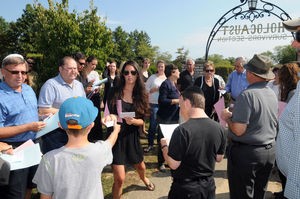Stockton in the Press of Atlantic City
Mitzvah Zecher Avot
In The Press of Atlantic City
The following is quoted from The Press of Atlantic City, 9/21, Vol. MMXV, No. 264, pages A3 and A8. Written by Martin Deangelis.
Remembering Family
Cemetery Ceremony Honors Those who Survived the Holocaust.

Inge Fixler remembered Sunday to take time out to remember. She was one of 75 or so people who went to Rodef Shalom Cemetery for a ceremony honoring the memories of their relatives and friends buried there, in a very special part of the cemetery. It's a section reserved for survivors of the Holocaust, the Nazis' World War II attempt to kill off all the Jews in Europe.
Gail Rosenthal, the director of Stockton University's Sara & Sam Schoffer Holocaust Resource Center, said Sunday's event was at least the 25th time the center has coordinated the ceremony. It's formally called a Mitzvah Zecher Avot, which translates roughly into the "good deed of remembering family."
That ceremony is usually held on the Sunday between the Jewish holy days of Rosh Hashanah and Yom Kippur, but Rosenthal acknowledged that the significance of this ceremony is nowhere near as widely known as those two high holy days are.
"Stop 10 Jewish people on the street and they may not even know what you're talking about," as she put it before the event started.
But at least four generations of local people understood the meaning and wanted to be part of it, in most cases because those survivors were their families. The bulk of the ceremony involved members of the crowd taking turns reading the names of people who lived through the Holocaust, but have died in the years since.
Many of those readers prefaced the names by stating their relationships - "My mother. ... My grandfather. ... My sister. ... My mother's closest friend. ... My brother." And on and on.
Inge Fixler lives in Northfield now, but she still has some of her native Germany in her voice. She survived the Holocaust herself by staying underground with her mother, but she was at the cemetery with several generations of her family to remember her husband, Abe, among many others.
She came "because my husband is here 23 years already. I think it's just the right thing to do," explained Inge, who surprised at least one cemetery visitor by saying she's 82 years old.
"I'm doing very well, thank God," she said, with a small smile. "I'm not in any hurry to get here."
And Rosenthal credited Inge's daughter, Lori Fixler, also of Northfield, with the idea of getting the crowd involved by having them read the names of the deceased. All those names were printed on two master lists - mens' names on blue paper, and womens' on pink - that ran on for six pages each, about 25 names to the page. In most past years, people just read down those lists with no other remarks, Rosenthal said.
One of Sunday's readers was Aiden Moss, 9, of Linwood, a great-grandson of Inge and Abe Fixler. He read the names of the grandfather and great-grandfather he never met in a stack of cards - all of people the boy never knew, his family said.
Rabbi Jonathan Kremer, of Congregation Beth Judah in Ventnor, also read a pile of cards in the list of survivors - names he said were familiar to him from his synagogue. And later he read a separate list, just of people who have died in the last year on the Jewish calendar.
He said that although there is a tradition to honor the memory of deceased relatives around the Jewish new year, Yom Kippur, that can be difficult in some families.
"A lot of their relatives are gone, and their ends are unknown," Kremer said.
Rosenthal added that Rodef Shalom Cemetery is one of just a few in the United States with its own section dedicated to Holocaust survivors. But not everyone with a memorial in the cemetery is a survivor - some names belong to people who didn't live through the Holocaust.
Rose and Mayer Zelkovitz now share a monument in Rodef Shalom, and a history of surviving the Holocaust. On the other side of that headstone, their family lists the names of many of her family members, all killed by a firing squad on the same day in 1941. Another column carries the names of his family members. All died in Auschwitz on the same day in 1944.

